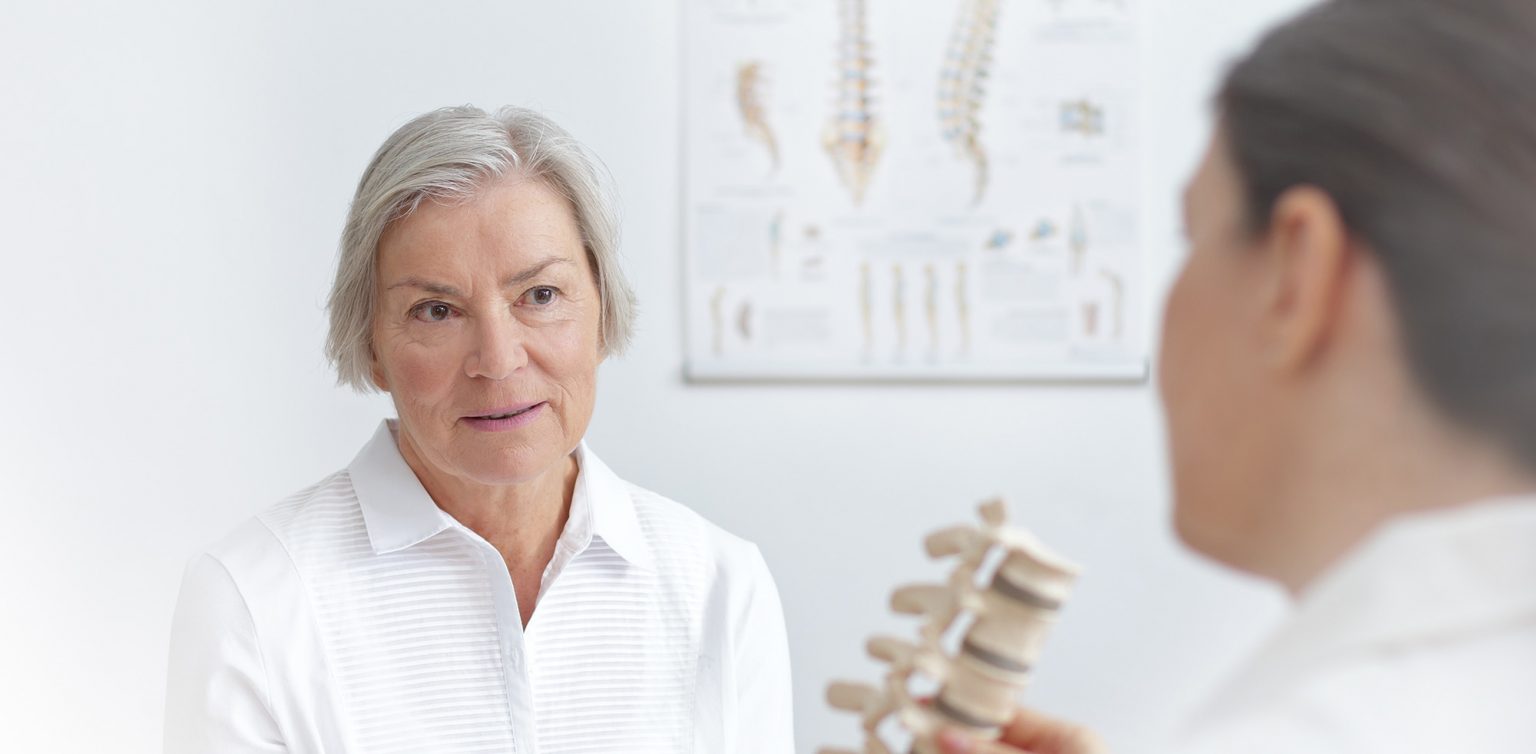
Posted On: April 18, 2020
Osteoporosis is a condition of the bones which often occurs with aging. It is defined as a disruption of the microarchitectural structure of bone which leads to a loss of bone mass and strength, and makes a person susceptible to fractures. Fragility fractures, as they are known, occur most often at the hip (especially the femoral neck), the vertebral bodies of the thoracic and lumbar spine, the wrist, the upper arm, and even ribs and parts of the knee joint (tibial plateau fractures).
There are a number of risk factors for developing osteoporosis. Race, age and gender, especially Caucasian women over age 65 and men over age 70 are perhaps the greatest risk factors. Having a family history, such as either parent with a history of hip fracture, is another significant risk factor. Low body weight (body mass index less than 20), current smoking, daily alcohol intake, and use of certain medications such as daily steroids for three months or longer, or certain medications used to treat breast cancer (aromatase inhibitors) also increase risk. Additionally, there are a number of medical conditions such as rheumatoid arthritis, type 1 diabetes, hyperparathyroidism and hyperthyroidism, vitamin D deficiency, and celiac disease which are associated with low bone mass and an increased risk of fractures.
The gold standard for screening for osteoporosis is the DXA scan, or “bone density test.” This radiology study, which takes a few minutes and has only 1/100th the radiation of a chest xray, can be ordered by your primary care provider or gynecologist. Most women don’t need this test until after they go through menopause.
There are also other radiologic methods, such as a heel ultrasound, and CT scanning, which may be used to determine bone density. Spine and hip x-rays can also be very useful in identifying fractures associated with osteoporosis.
All women over the age of 65 should be screened once for osteoporosis. Any women between 45-65 with the above mentioned risk factors might also benefit from a bone density test. According to the National Osteoporosis Foundation, men aged 70 and over should also be screened for osteoporosis. There is an online tool known as FRAX (Fracture Risk Assessment calculator) which can also be helpful to determine whether a bone density test should be done. For those with a fracture risk above 9.3%, bone density testing is indicated. For those with a global fracture risk above 20% or hip fracture risk above 3%, treatment is usually warranted.
First, smokers should quit smoking. Consuming adequate calcium and Vitamin D are important. Often, enough calcium (1200-1500 mg daily) can be consumed in the diet, and obtaining calcium naturally is preferred to taking large supplement doses. For those who are sensitive to lactose or have a gluten sensitivity, supplements can help one to reach the recommended daily amount. Vitamin D is converted by the skin and sunshine to its active form in the body, when exposed to sunlight without wearing sun block. Generally, most of us need Vitamin D supplementation (about 800 ius daily) to reach the daily recommended amount. Weight bearing exercise (such as walking, jogging, dancing or climbing stairs) is very important to maintaining strong bones. Strengthening exercises for the core and paraspinous muscles can be beneficial in maintaining a strong and healthy spine. Osteoporosis is most often a disease seen in women with estrogen deficiency, so replacing estrogen in those who go through premature menopause (before age 45) can also be helpful for prevention.
Lifestyle changes, such as lots of weight-bearing exercise, quitting smoking, consuming adequate calcium and Vitamin D, are the first step to preventing osteoporosis. Once it has developed though, your doctor should perform a series of blood tests to check for medical conditions which cause osteoporosis, and correct any issues which can be addressed. If bone density testing shows low bone mass, then medication management may be warranted. The bisphosphonates (such as alendronate, risedronate, zoledronic acid) have been the mainstay of osteoporosis treatment for many years. These medications can reduce fracture risk by half, and are important to help prevent the first fracture, and particularly after the first fracture has occurred, because fracture risk is significantly higher then. There are several other families of medications which have been shown to be helpful, such as selective estrogen receptor modifiers, rank ligand inhibitors, and parathyroid hormone. They come in various forms, ranging from daily pills to daily injections, semiannual shots, and yearly infusions. Your doctor can help you decide which treatment is best for you.

April is National Oral Health Month! Did you know? A healthy smile is more than just a cosmetic asset—it's a cornerstone of overall wellness! 🦷✨ From reducing the risk of heart disease to enhancing mental health, oral health plays a pivotal role in our wellness journey. Let's prioritize those dental check-ups and daily oral care routines for a happier, healthier you!

Multiple sclerosis (MS) is a chronic autoimmune disease of the central nervous system. MS is unpredictable. Some people may be only mildly affected. Others may lose the ability to see, write, speak, or walk. It is important to note that no two individuals experience the same symptoms and these symptoms can also change or fluctuate over time.

With the days getting longer and the first signs of warmth returning to the air, we know spring is coming. Spring is typically associated with new beginnings and fresh starts. It’s the perfect time to tidy up, physically and mentally. Spring cleaning isn’t just about sprucing up your living space, it’s also about rejuvenating your body & mind. Check out the blog linked below for tips on how to declutter your mind and space! https://www.mymsmedicine.com/blog/revitalize-your-mind-and-body-the-ultimate-guide-to-spring-cleaning
Seeking more information?
Ready to schedule a meet-and-greet, health consult, or COVID-19 test?
Complete the form below and we will contact you shortly.
